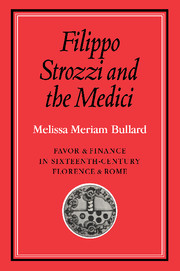2 - Filippo Strozzi's Florence
Published online by Cambridge University Press: 07 October 2011
Summary
Although the Medici regime established in Florence after 1512 was heir to the earlier governments of Cosimo il Vecchio and Lorenzo il Magnifico of the fifteenth century, important differences between them show that the city, once so fiercely proud of her republican traditions, had moved decidedly towards a principate. The evidence that Medici patronage determined a person's political and economic position within the state indicates that they had consolidated their power in the city and had secured the acquiescence of the Florentine aristocracy in their hegemony. In the sixteenth century, as the Medici extended their control over the government, they distributed political offices and influence to their friends and supporters and denied them to their opponents. This growing dependency of the Florentine aristocracy on the Medici had an economic side which served to win them devoted adherents such as Filippo Strozzi.
A comparison of Strozzi's situation in the sixteenth century with that of his father in the fifteenth shows the relationship that obtained between his banking success and the favor he received. Back in the 1430s the Strozzi family had been ostracized as adversaries of the Medici. Strozzi's father, Filippo di Matteo, was exiled as a child from Florence following the exile of his own father and other members of the Albizzi faction who had opposed the return of Cosimo de'Medici to the city. He lived in Naples where, unmolested by his political enemies, he was able to make his fortune as a banker at the Neapolitan court. Eventually in 1466 Lorenzo il Magnifico welcomed him back to his native city.
- Type
- Chapter
- Information
- Filippo Strozzi and the MediciFavor and Finance in Sixteenth-Century Florence and Rome, pp. 9 - 44Publisher: Cambridge University PressPrint publication year: 1980



